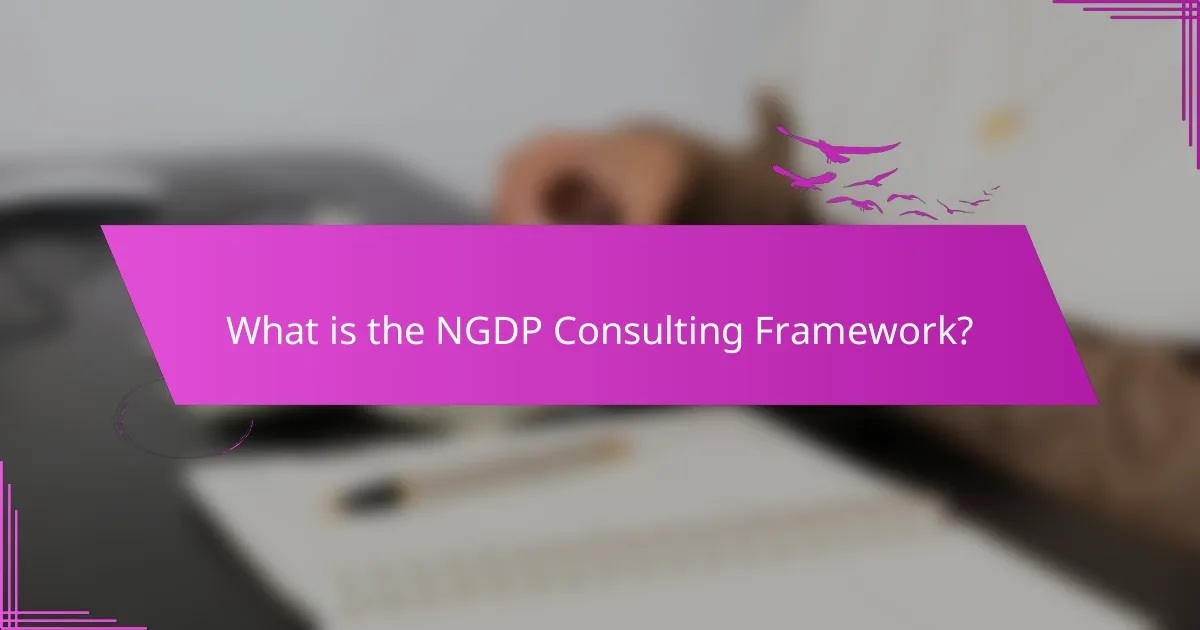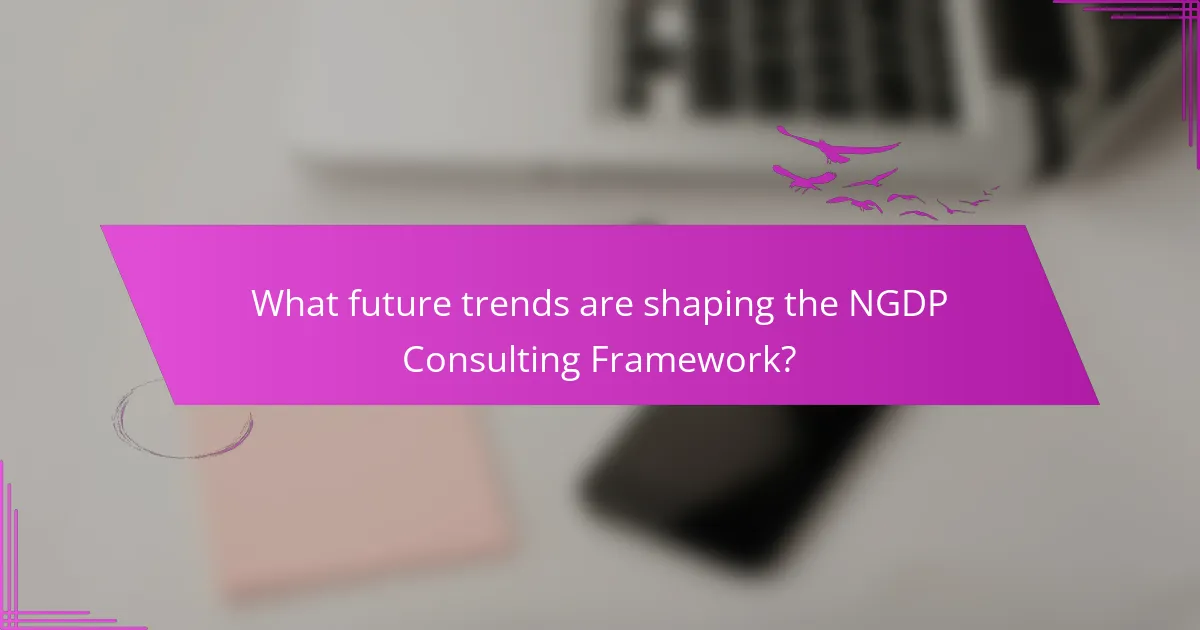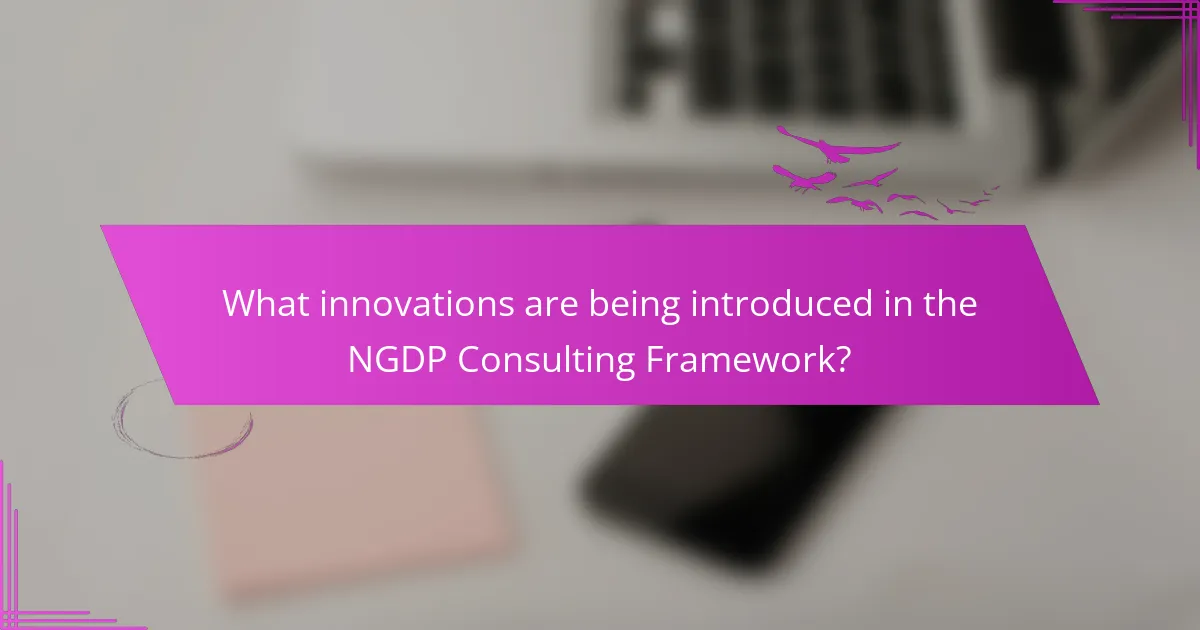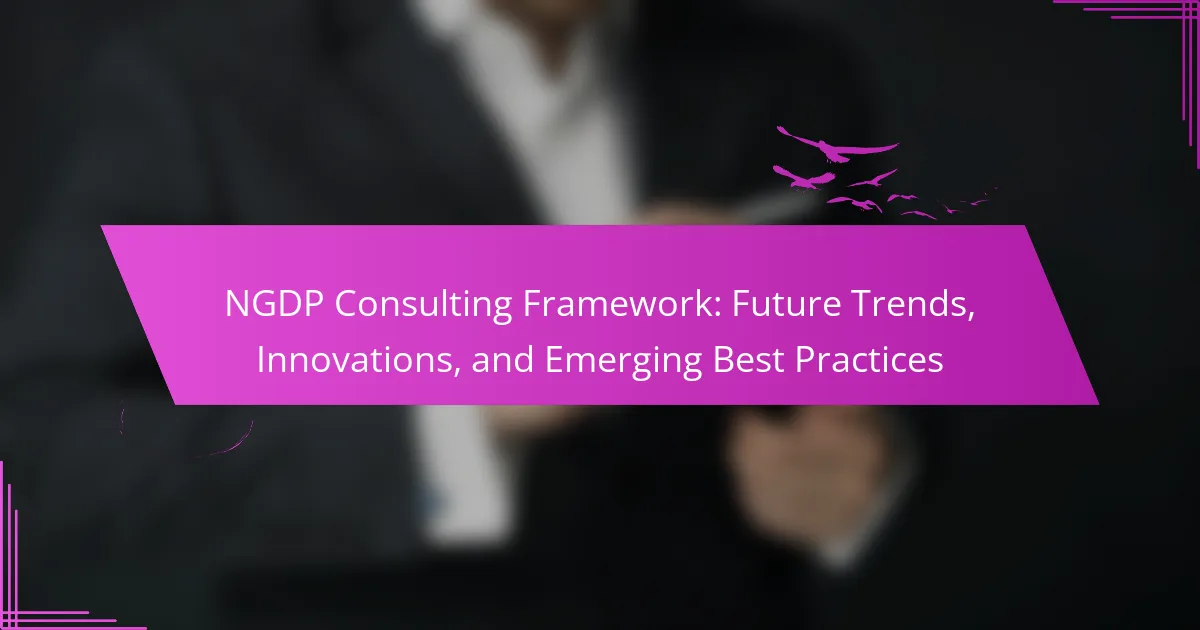
What is the NGDP Consulting Framework?
The NGDP Consulting Framework is a structured approach designed to enhance organizational performance. It focuses on integrating data-driven decision-making with strategic planning. This framework emphasizes the importance of aligning business objectives with operational capabilities. It aids organizations in navigating complex environments by providing clear methodologies. The framework incorporates best practices from various industries to ensure adaptability. Its application has been shown to improve efficiency and drive innovation. Organizations using the NGDP Consulting Framework report better alignment of resources and improved outcomes. This framework is increasingly recognized as vital for future organizational success.
How does the NGDP Consulting Framework operate?
The NGDP Consulting Framework operates by integrating systematic methodologies for project management and client engagement. It emphasizes clear communication and collaboration among stakeholders. The framework utilizes data-driven insights to inform decision-making processes. This approach enhances efficiency and effectiveness in achieving project goals. Additionally, it incorporates continuous feedback loops to refine strategies and improve outcomes. The framework is adaptable to various industries and project types. By focusing on best practices, it drives innovation and future trends in consulting. The effectiveness of the NGDP Consulting Framework is supported by case studies demonstrating successful implementations across diverse sectors.
What are the key components of the NGDP Consulting Framework?
The key components of the NGDP Consulting Framework include stakeholder engagement, data analysis, strategic planning, and implementation support. Stakeholder engagement ensures that all relevant parties are involved in the decision-making process. Data analysis provides insights through quantitative and qualitative methods. Strategic planning outlines the goals and objectives based on the analysis. Implementation support facilitates the execution of strategies and measures progress effectively. Each component is essential for a comprehensive approach to consulting within the NGDP framework.
What role do stakeholders play in the NGDP Consulting Framework?
Stakeholders play a critical role in the NGDP Consulting Framework. They provide essential insights and feedback during the consulting process. Their involvement ensures that diverse perspectives are considered in decision-making. Stakeholders help identify key challenges and opportunities within the organization. They also contribute to the alignment of project goals with organizational objectives. Active participation from stakeholders enhances the framework’s effectiveness. Their engagement fosters collaboration and builds trust among all parties involved. Overall, stakeholders are integral to the successful implementation of the NGDP Consulting Framework.
What are the main objectives of the NGDP Consulting Framework?
The main objectives of the NGDP Consulting Framework are to enhance organizational performance and drive sustainable growth. This framework aims to provide structured guidance for consulting practices. It focuses on aligning strategies with client needs and market demands. Additionally, it promotes the integration of innovative solutions into business processes. The framework emphasizes collaboration among stakeholders to achieve common goals. It also seeks to establish measurable outcomes for consulting engagements. Overall, the NGDP Consulting Framework is designed to foster adaptability in a changing business environment.
How does the NGDP Consulting Framework enhance organizational performance?
The NGDP Consulting Framework enhances organizational performance by providing structured methodologies for strategic development. It aligns organizational goals with actionable insights, facilitating improved decision-making. This framework promotes collaboration across departments, fostering a culture of innovation. It also emphasizes data-driven approaches to assess performance metrics effectively. By integrating feedback loops, organizations can adapt strategies in real-time. Additionally, the framework encourages continuous learning and development among employees. This results in higher employee engagement and productivity. Overall, the NGDP Consulting Framework creates a cohesive environment that drives sustainable growth and efficiency.
What metrics are used to evaluate the success of the NGDP Consulting Framework?
The success of the NGDP Consulting Framework is evaluated using several key metrics. These metrics include client satisfaction scores, project completion rates, and return on investment (ROI). Client satisfaction scores gauge the perceived value of consulting services. Project completion rates measure the effectiveness of the framework in delivering results on time. ROI quantifies the financial benefits gained from the consulting interventions. Additionally, employee engagement levels and operational efficiency improvements are also considered. These metrics collectively provide a comprehensive assessment of the framework’s impact and effectiveness in achieving its goals.

What future trends are shaping the NGDP Consulting Framework?
The future trends shaping the NGDP Consulting Framework include increased digital transformation, data-driven decision-making, and a focus on sustainability. Digital transformation is driving organizations to adopt new technologies for improved efficiency. Data-driven decision-making enhances the accuracy of strategic planning. A focus on sustainability reflects growing environmental concerns among businesses. Additionally, remote collaboration tools are becoming essential for consulting practices. These trends are supported by industry reports indicating a shift towards agile methodologies. According to a McKinsey report, 70% of organizations are prioritizing digital initiatives. This data underscores the importance of adapting to these emerging trends within the NGDP Consulting Framework.
How is technology influencing the NGDP Consulting Framework?
Technology is significantly influencing the NGDP Consulting Framework by enhancing data analysis capabilities. Advanced analytics tools allow consultants to interpret large datasets more effectively. This leads to better decision-making and strategic planning. Automation streamlines processes, reducing time spent on routine tasks. Cloud computing facilitates real-time collaboration among teams, regardless of location. Additionally, artificial intelligence provides insights that were previously unattainable. These technological advancements improve overall efficiency and client outcomes. As a result, the NGDP Consulting Framework evolves to incorporate these innovations, driving better performance and adaptability in consulting practices.
What emerging technologies are being integrated into the NGDP Consulting Framework?
The NGDP Consulting Framework is integrating artificial intelligence, machine learning, and blockchain technologies. Artificial intelligence enhances data analysis and decision-making processes. Machine learning improves predictive analytics and client insights. Blockchain technology ensures data security and transparency in transactions. These technologies are reshaping consulting practices and delivering innovative solutions. Their implementation leads to increased efficiency and better client outcomes.
How does data analytics impact decision-making within the NGDP Consulting Framework?
Data analytics significantly enhances decision-making within the NGDP Consulting Framework. It enables consultants to derive actionable insights from complex data sets. By analyzing trends and patterns, decision-makers can identify opportunities and risks. This data-driven approach leads to more informed strategies. For instance, predictive analytics can forecast market shifts, allowing proactive adjustments. Additionally, data visualization tools simplify complex information, making it accessible for stakeholders. Overall, integrating data analytics fosters a culture of evidence-based decision-making within the framework.
What are the anticipated changes in consulting practices related to the NGDP Framework?
Anticipated changes in consulting practices related to the NGDP Framework include increased emphasis on data-driven decision-making. Consultants will leverage advanced analytics to provide insights. This shift aligns with industry trends toward evidence-based strategies. Additionally, collaboration with technology partners will become essential. Consultants will integrate AI tools to enhance service delivery. There will also be a focus on sustainability and social impact in consulting engagements. This change reflects growing client demand for responsible practices. Overall, firms will adapt to remain competitive in a rapidly evolving landscape.
How are client expectations evolving in relation to the NGDP Consulting Framework?
Client expectations are evolving towards greater customization and transparency within the NGDP Consulting Framework. Clients increasingly demand tailored solutions that address their specific needs. They expect consultants to provide clear, measurable outcomes and demonstrate the value of their services. Additionally, clients are looking for more collaborative engagement throughout the consulting process. This shift is driven by the need for agility in responding to market changes. Recent surveys indicate that 75% of clients prefer consultancies that leverage data analytics for decision-making. This data-driven approach enhances trust and satisfaction in consulting relationships.
What role does sustainability play in the future of the NGDP Consulting Framework?
Sustainability is integral to the future of the NGDP Consulting Framework. It shapes strategic decision-making and aligns with global environmental goals. The framework emphasizes sustainable practices to enhance client value and long-term viability. Incorporating sustainability can lead to innovative solutions that address pressing societal challenges. Research shows that organizations prioritizing sustainability often experience improved financial performance. This trend indicates a shift towards responsible business practices in consulting. Therefore, sustainability is not just a trend but a fundamental aspect of the NGDP Consulting Framework’s evolution.

What innovations are being introduced in the NGDP Consulting Framework?
The NGDP Consulting Framework is introducing several key innovations. Firstly, it incorporates advanced data analytics for more informed decision-making. This allows consultants to leverage big data insights effectively. Secondly, the framework emphasizes agile methodologies to enhance project adaptability. Agile practices enable quicker responses to client needs. Thirdly, there is a focus on integrating artificial intelligence tools. AI assists in automating routine tasks and improving efficiency. Additionally, the framework promotes collaborative platforms for enhanced team communication. These platforms foster real-time collaboration among stakeholders. Lastly, the framework includes sustainability metrics to evaluate project impacts. This ensures alignment with environmental and social governance goals.
How are new methodologies enhancing the NGDP Consulting Framework?
New methodologies are enhancing the NGDP Consulting Framework by integrating agile practices and data analytics. These methodologies promote flexibility and responsiveness in project management. Agile practices enable teams to adapt quickly to changing client needs. Data analytics provides insights for informed decision-making. The incorporation of these approaches leads to improved client satisfaction and project outcomes. For instance, organizations using agile methodologies report a 30% increase in project success rates. Overall, these enhancements streamline processes and foster innovation within the framework.
What innovative strategies are being adopted by consultants using the NGDP Framework?
Consultants are adopting several innovative strategies using the NGDP Framework. These strategies include data-driven decision-making to enhance client outcomes. Consultants leverage advanced analytics to identify trends and insights. They also implement agile methodologies for project management, allowing for flexibility and rapid adaptation. Collaboration tools are utilized to improve communication and stakeholder engagement. Additionally, consultants focus on sustainability practices to align with clients’ corporate social responsibility goals. Workshops and training sessions are conducted to foster a culture of continuous improvement. These strategies enhance the effectiveness of the NGDP Framework in delivering value to clients.
How do these innovations improve client engagement and outcomes?
Innovations in the NGDP Consulting Framework enhance client engagement and outcomes by leveraging advanced technologies and data analytics. These tools facilitate personalized communication, allowing for tailored interactions based on client preferences. Enhanced data collection methods provide insights into client behavior and needs. This leads to more effective strategies and solutions that resonate with clients. Furthermore, real-time feedback mechanisms enable continuous improvement in service delivery. As a result, clients experience increased satisfaction and loyalty. According to a study by McKinsey & Company, companies that utilize data-driven personalization can see a 10-30% increase in client engagement.
What best practices are emerging within the NGDP Consulting Framework?
Emerging best practices within the NGDP Consulting Framework include a focus on data-driven decision making. This practice enhances the accuracy of insights derived from client data. Additionally, stakeholder engagement is emphasized to ensure alignment with client goals. Regular feedback loops are implemented to adapt strategies effectively. Collaborative problem-solving sessions are increasingly utilized to foster innovation. Furthermore, agile methodologies are being adopted to improve project flexibility and responsiveness. These practices are supported by case studies demonstrating improved client satisfaction and project outcomes.
How can organizations implement effective practices based on the NGDP Framework?
Organizations can implement effective practices based on the NGDP Framework by following structured steps. First, they should assess their current capabilities and identify gaps in alignment with the framework. This assessment helps in understanding specific areas needing improvement. Next, organizations should establish clear objectives that align with the principles of the NGDP Framework. This ensures that all efforts are directed towards common goals.
Subsequently, organizations must engage stakeholders throughout the implementation process. Involving key personnel fosters collaboration and buy-in, enhancing the effectiveness of practices. Training programs should be developed to equip employees with the necessary skills aligned with the NGDP Framework. This investment in human capital is crucial for successful implementation.
Additionally, organizations should regularly monitor and evaluate the effectiveness of the implemented practices. This ongoing assessment allows for adjustments and improvements based on real-time feedback. Finally, sharing best practices and lessons learned within the organization promotes a culture of continuous improvement. By systematically following these steps, organizations can effectively implement practices based on the NGDP Framework.
What common challenges do organizations face when adopting the NGDP Consulting Framework?
Organizations face several common challenges when adopting the NGDP Consulting Framework. Resistance to change is a primary issue. Employees may be hesitant to shift from established practices. This can lead to a lack of engagement during implementation. Additionally, inadequate training can hinder effective use of the framework. Without proper understanding, employees may struggle to apply new concepts. Resource allocation also poses a challenge. Organizations may not dedicate sufficient time or budget for a successful transition. Furthermore, aligning the framework with existing processes can create friction. Misalignment can result in confusion and inefficiencies. Lastly, measuring success can be difficult. Organizations often lack clear metrics to evaluate the framework’s impact. These challenges can impede the successful adoption of the NGDP Consulting Framework.
What practical tips can organizations follow to leverage the NGDP Consulting Framework effectively?
Organizations can leverage the NGDP Consulting Framework effectively by aligning their goals with the framework’s principles. They should first assess their current processes to identify areas for improvement. Implementing a structured approach to project management is crucial. This includes defining clear objectives and measuring progress regularly. Engaging stakeholders throughout the process ensures buy-in and support. Training team members on the framework’s methodologies can enhance overall effectiveness. Utilizing data analytics within the framework can provide insights for informed decision-making. Finally, organizations should continuously review and adapt their strategies based on outcomes and feedback.
The NGDP Consulting Framework is a structured methodology aimed at enhancing organizational performance through data-driven decision-making and strategic planning. This article covers the framework’s operational components, including stakeholder engagement, data analysis, and implementation support, while highlighting its role in driving innovation and sustainable growth. Key trends influencing the framework, such as digital transformation and sustainability, are discussed alongside emerging technologies like artificial intelligence and machine learning. Additionally, the article outlines best practices and practical tips for organizations to effectively adopt the NGDP Consulting Framework, addressing common challenges faced during implementation.
